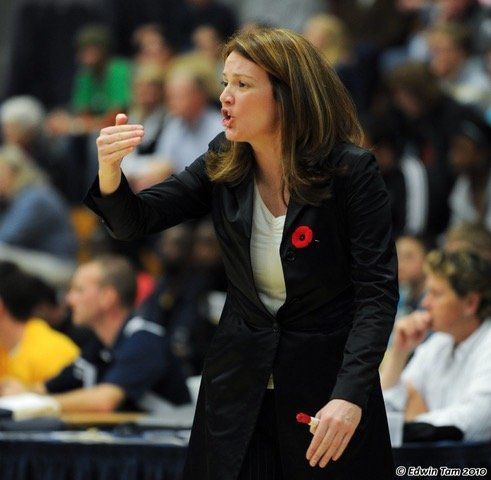FEATURED ARTICLE
By Bob Duff

Hamilton Honey Badgers: Vallée’s newest legacy
Making history? The notion never entered Chantal Vallée’s thought process.
Announced November 21 as the first coach and general manager of the Canadian Elite Basketball League’s Hamilton Honey Badgers, Vallée, one of the all-time winningest coaches in Canadian U Sports basketball, is the first woman anywhere in basketball history to be named as both head coach and general manager of a men’s professional team, and only the second woman ever to serve as a head coach of a men’s professional basketball team.
“I didn’t even know about this,” Vallée said. “It didn’t even cross my mind that this would the first time a woman had held these roles with a men’s professional team.”
When this fact was brought to her attention, Vallée gave a cursory shrug and moved on. “I said, ‘OK, that’s nice,’” she recalled. “And then I said, ‘What’s the schedule like? How are we going to get the players?’
“While I fully realize the significance of this, and the impact it can have on others, it wasn’t something that was as important to me as other considerations.”
Getting down to business. Going to work. That’s what Vallée is all about. Making history? Immaterial.
Creating a legacy. That’s what Vallée does, and it’s what she’s been all about for her entire coaching career.
When she took over the women’s basketball program at the University of Windsor in 2005, the Lancers had never won an OUA playoff game and enjoyed only four winning seasons in 45 years. She guided the Lancers to a record-tying five consecutive National Championship titles from 2011-15, and her teams made 11 straight trips to the OUA Final Four, earning medals nine
consecutive times.
Vallée has a career winning percentage of .791 (351-93) through 13 seasons as head coach of the University of Windsor, a position she will continue to hold while also running the Honey Badgers.
“I’ll still be coaching the Windsor Lancers and continuing to push my team to greater heights,” Vallée said. Once the U Sports season concludes she will relocate to Hamilton for the CEBL campaign, which opens in May.
It wasn’t the chance to coach men that inspired Vallée to take on the task of assembling and leading the Honey Badgers. It was the same passion that drives all elite coaches in all sports that brought her to Hamilton – the opportunity to test her mettle at a higher level in her chosen sport.
“I didn’t look for this nor expect it,” Vallée said. “But the opportunity came, and what was interesting to me about the challenge more than anything else was the level of play, the expertise and having the experience to coach at such a high level. That’s what was attractive to me, coaching professional players.”
Vallée doesn’t consider herself to be a woman coaching men, but simply a basketball coach coaching players.
“I think because I’ve had the chance to coach guys before, I can tell you human beings are human beings,” Vallée said. “Athletes want to be coached. They want to win. They want to be respected. They want to be treated with the utmost professionalism. That’s across the board.
“Coaching is a lot more about managing people. Whether you coach rugby, football, soccer, or basketball, or whether you coach men or women, what we have in common is the quest to get a human being to perform at a high level. We all want to know what the solution is. How do you get this person to perform under pressure? How do you get a team to gel together and peak at the right time?
“Those are discussions I’ve had with many coaches in various sports. I’ve had great revelations and things I’ve learned from hockey coaches. I’ve had great discussions with Baseball Canada and Softball Canada coaches. It’s been across the board learning. As coaches, we’re generous people in sharing what we know.”
At the same time Vallée recognizes that she will face daunting challenges coaching in the professional ranks, where players are pursuing the chance to go as far as they can in their chosen sport, and rosters tend to be much more fluid in season than at the university level.
“Certainly, coaching professionals, coaching guys will present a faster pace,” Vallée said. “I think it’s going to be super exciting. The skill level will be higher. Some of these guys will have been playing pro for several years overseas, so they will be older, more mature. It will certainly be different.”
Vallée’s achievements have been honoured with 22 basketball and all-sports Coach of the Year awards from numerous sports bodies, including twice being named Canadian U Sports Coach of the Year. In 2016, Vallee was named CAAWS Most Influential Woman in Canada, in the Coach category.
She will draw upon the network of coaches she’s come to know from her decades of work at the U Sports level to help her mold the roster for the Honey Badgers.
“A lot of the guys have coached women before,” Vallée said. “When we are talking at a coach’s clinic or in coaching circles we have much in common – even when I first started at Windsor, the amount of help that (Carleton men’s basketball coach) Dave Smart gave me was tremendous. I remember Dave spending a lot of time with me after a clinic, talking on the phone, texting back and forth or chatting after a game. We all help each other as coaches.”
Seven of the 10 players on a CEBL roster must be Canadian, and Vallée thinks that gives her a significant advantage because of her familiarity with the Canadian university game.
“Most of them I’ve seen play at the U Sports level or for the national team,” Vallée said. “I already know a lot of the different guys the league is trying to target. I think it will be a different challenge in trying to build a team and choose a roster based on a draft. That’s exciting.”
With the explosion of growth in basketball on the Canadian landscape, and our country’s increasing presence at all levels of the game, Vallée believes the timing couldn’t be better for the emergence of the CEBL.
“There’s so much excitement about the sport in Canada,” Vallée said. “Hockey is always going to be important of course, but the amount of young men and women that just want to play basketball is growing. A big part of that is the talent that we produce as Canadian coaches in high school, at the grassroots, and at the university level.
“The athletes that we have here that are hard-working and making their path to breaking records, whether it’s at U Sports or in the NCAA. There are coaches like Dave Smart that win championships and create a legacy, and the NBA players that are coming from Canada.
“Our national teams on the men’s and women’s sides have done so well. The women have qualified for the Olympics and the men are most likely going to qualify. Around the world, there is now an understanding that people have to take Canada seriously when it comes to basketball, and I don’t think that was there even a decade ago. That is because of the work of current players and coaches. We’re the ones who created that, and now I think people look up to us and say, ‘wow.’
“We are there now. We have the luxury to be able to offer this to our basketball players in Canada now.”
That’s the legacy Vallée plans to provide to Hamilton and the CEBL.
“What matters to me as a coach is to be successful in my endeavors,” Vallée said. “That’s what I want to do, that’s what I have done, and that’s what I want to continue to do – create successful teams, build championship teams, and develop people that are going to become better humans, better citizens, better basketball players, better workers in all sorts of fields, whether they’re men or women. That’s part of what I think the job of a coach is.”
It’s the only kind of history that she’s interested in making.
By Bob Duff, for the Hamilton Honey Badgers

